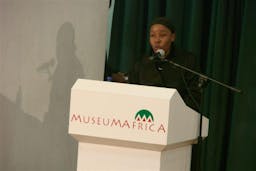Revolution Going Wrong Perhaps?
Jan 21, 2015
Story
I was 7 years old when the first democratic elections took place in South Africa. I wept, because I was not old enough to vote and wanted to be a part of history in the making. It was a big day for me, not only because of the excitement and joy I saw all around me- but because even at that tender age, I knew where we had come from as a country.
My mother was involved politics since her student days. I remember her sharing stories of the Black Consciousness meetings in Montshioa and also keeping me constantly updated on what was happening politically in the rest of South Africa. I also remember when the right wingers tried to stage a coup in what was then Bophutatswana and we had the army tanks bearing the AWB flag constantly driving up and down our roads. Many children did not know what was happening, they thought the soldiers were there to protect us from a war happening in South Africa- which we were not a part of. It made me feel good to be to know what was happening, not that I breathed a word to anyone about it.
State Security came after my mother’s fellow comrade, doing him severe damage- he wasn’t the only one. My mother didn’t hide this from me, something I appreciate. I always knew what was happening when she came home reeking of teargas, with endless cuts and bruises. Although I feared for her safety, it made me proud to have a mother standing in the frontlines. Although not as glamorous as the heroic activities often showed to us on TV, she and her fellow comrades were (and still are) my heroes.
Here I am today as a soon to be 26-year old woman, 18 years into democracy. And the majority of black people in South Africa are still living in poverty and in severely underdeveloped areas. Without a doubt, I always knew that centuries of oppression would never be undone in a few decades. It stands to reason that it would take a long time and a lot of hard work to undo the great atrocity that is South Africa’s past.
However, it cannot be ignored that the revolution in South Africa did not complete its manifestation. Even before the ANC took over power and became the governing party, the revolution had been undone. During CODESA, many concessions were made and the will of the majority was given up for the co-opting of a few. The full-reach of apartheid was thus not fully dismantled and the after effects can still be felt today.
The lesson that should be taken from this history of South Africa is that, contrary to popular belief, fighting the same enemy and even ‘overcoming’ that enemy together does not make you friends. Nor does it mean that you are fighting for the same thing, which is what most assume. In our midst are people working for change, but the results of the change being worked for are not necessarily the same. South Africa’s history and more recently, events in Egypt teach us that there are people who usurp revolutions to suit their purposes. This is dangerous as it often means not really ending oppression, but rather changing the faces of the oppressors.
Fast forward to 2012, a year that saw my interest in gender issues develop into something more. I started reading up on women’s movements in South Africa and connecting with feminists and feminist groups, using social media. I read many articles from prominent feminists and was very pleased to discover that they are increasingly using the tools at their disposal to advance the cause. It is also clear that there is a growing call in South Africa for a revolution not only to end violence against women, but to advance women’s rights as a whole.
This revolution is not only about choice. The choices we make are not made in a vacuum, they happen as a result of the various socialisers which we come across straight from birth. This includes not only the family, but also community, school, church and even politics amongst others. So a revolution for women, should not only be about choice, but also about interrogating power, which often ensures that the women are socialised by patriarchal standards and thus, womanhood is defined by these patriarchal standards and symbols. It is also about reclaiming that power, so that women’s bodies and beings can be taken back, with us having total and complete control of them. Over and above this, it also means interrogating the racial and socio-economic dynamics of power, amongst its’ various other functions.
My interest in this is what a revolution of women would mean to the woman who does not read op-eds; the woman to who words like phallocentric misogyny and patriarchy have no meaning. The woman who may never read this post. The woman who will never read the many articles and papers defining what some envision this ‘revolution’ to be.
I know this woman, in fact, I know many of them. Women who like me, have no knowledge of theories and women for whom the knowledge thereof would have very little bearing on their daily lives. These women I know are amongst many whose actions and way of lives are no less radical than anyone wearing any label. But I am curious about what the women’s ‘revolution’ would mean for her and I. A life of impositions from the labelled? Because from where I am looking, that is exactly what it seems to me.
This post was originally put on my personal blog http://koketsomoeti.wordpress.com The topic continues to be very close to my heart because increasingly I see women like myself being shut-out from this revolution. But we are not voiceless and will continue to roar until we are heard.




